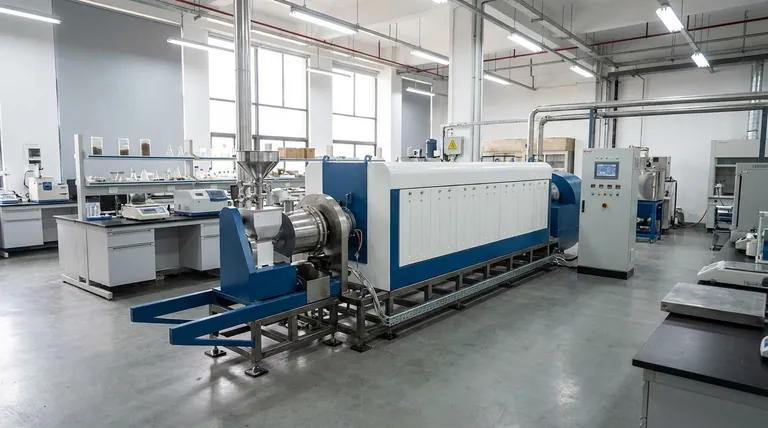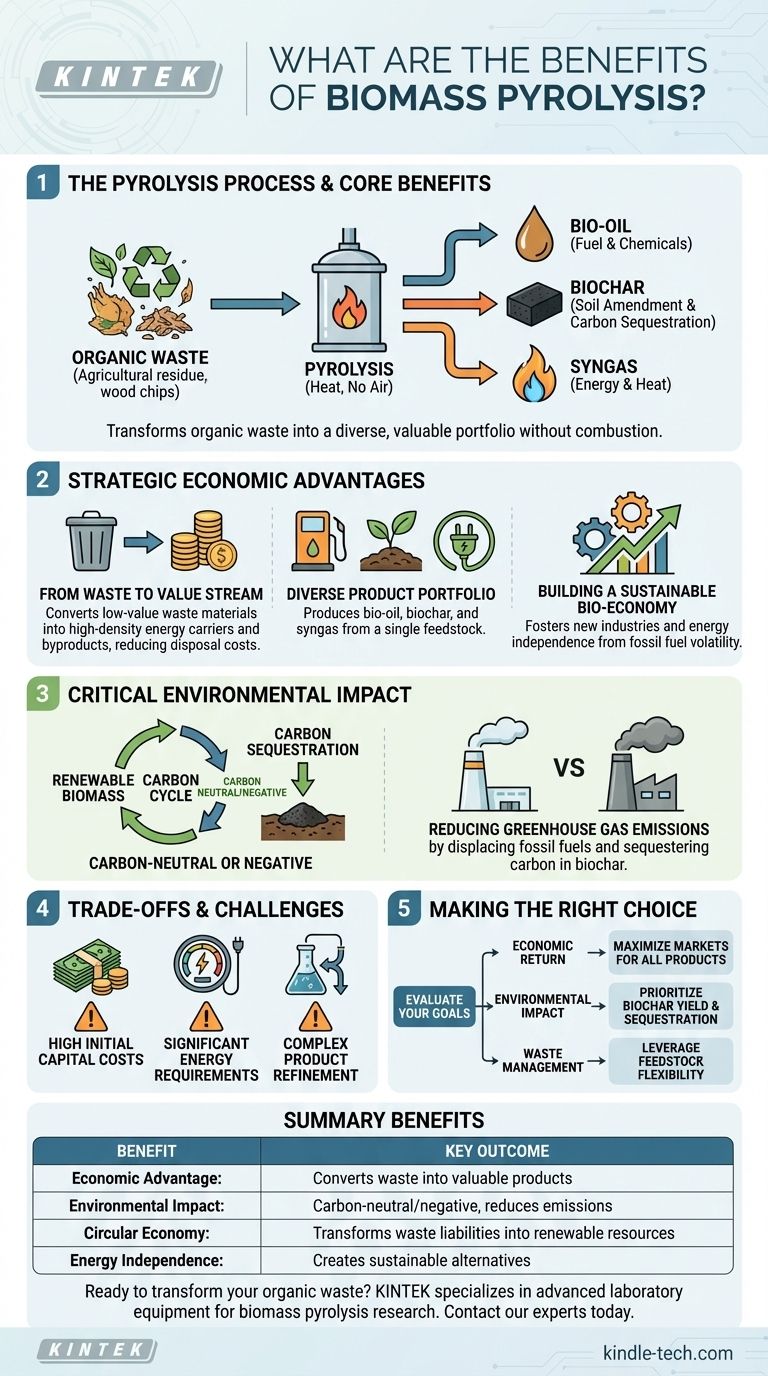At its core, biomass pyrolysis is a powerful thermochemical decomposition process that transforms organic waste into valuable resources without combustion. The primary benefits are its ability to convert low-value waste materials into high-density energy carriers and valuable byproducts, reduce greenhouse gas emissions compared to fossil fuels, and create new economic opportunities from renewable resources.
The true advantage of biomass pyrolysis is not just in waste reduction or energy generation, but in its strategic capability to convert diverse, often problematic, organic waste streams into a stable and valuable portfolio of products: a liquid fuel, a solid soil amendment, and a combustible gas.

The Strategic Economic Advantages
Biomass pyrolysis fundamentally alters the economic equation for organic waste. It re-frames materials often considered liabilities—such as agricultural residue or wood scraps—as valuable feedstocks for new industries.
From Waste Stream to Value Stream
The process is highly flexible, capable of utilizing a wide range of organic materials. This includes agricultural residues, wood processing waste, and even certain components of municipal solid waste.
This transforms disposal costs into revenue opportunities, creating a circular economy model where waste is a resource.
Creating a Diverse Product Portfolio
Pyrolysis does not produce a single output, but rather a slate of valuable byproducts from a single feedstock.
The primary outputs are:
- Bio-oil: A high-energy-density liquid that can be refined into transportation fuels or used to produce chemicals.
- Biochar: A stable, carbon-rich solid that sequesters carbon and can be used as a potent soil fertilizer.
- Syngas: A mixture of combustible gases that can be used to power the pyrolysis process itself, making it energy self-sustainable.
Building a Sustainable Bio-Economy
By providing a viable alternative to fossil fuels, pyrolysis supports the creation of new, resilient industries. This fosters long-term economic benefits and energy independence, insulated from the volatility of global fossil fuel markets.
The Critical Environmental Impact
Beyond the economic incentives, the environmental benefits are a primary driver for adopting pyrolysis technology. It offers a clear pathway to a more sustainable energy and carbon management system.
A Carbon-Neutral or Carbon-Negative Process
Because pyrolysis uses renewable biomass, the carbon dioxide released when its products are used is part of the natural, short-term carbon cycle. It does not introduce new carbon into the atmosphere as fossil fuels do.
Crucially, the production of stable biochar allows for long-term carbon sequestration. When added to soil, this carbon is locked away for centuries, potentially making the entire process carbon-negative.
Reducing Greenhouse Gas Emissions
Displacing fossil fuels with energy derived from pyrolysis products directly reduces emissions of CO2, sulfur oxides, and other pollutants. The robust and clean nature of the technology gives it a significant role in global carbon markets.
Understanding the Trade-offs and Challenges
While powerful, pyrolysis is not a universally simple solution. A clear-eyed assessment requires understanding its operational and economic hurdles.
High Initial Capital Costs
The equipment required for a pyrolysis plant, including the reactor, furnace, and product separation systems, represents a significant upfront investment. This can be a barrier to entry, particularly for smaller-scale operations.
Significant Energy Requirements
The process itself is energy-intensive, requiring high temperatures to decompose the biomass. While the production of syngas can make a plant self-sustaining, a substantial external energy source is often needed for startup and process stabilization.
Complexity in Product Refinement
The raw outputs of pyrolysis are rarely ready for immediate end-use. The mixed product stream requires efficient separation and purification, which can be time-consuming and expensive.
For example, bio-oil is often acidic and unstable, requiring significant refining before it can be used as a drop-in transportation fuel.
Making the Right Choice for Your Goal
Evaluating pyrolysis requires aligning the technology's strengths with your specific objectives.
- If your primary focus is economic return: Your success will depend on securing markets for all three primary products—bio-oil, biochar, and syngas—to maximize profitability and offset high capital costs.
- If your primary focus is environmental impact: Prioritize processes that maximize the yield and stability of biochar to achieve verifiable carbon sequestration.
- If your primary focus is waste management: Leverage the technology's feedstock flexibility to process diverse and challenging organic waste streams, turning a disposal problem into a resource.
Ultimately, biomass pyrolysis offers a compelling framework for transforming environmental liabilities into sustainable economic assets.
Summary Table:
| Benefit | Key Outcome |
|---|---|
| Economic Advantage | Converts waste into valuable products (bio-oil, biochar, syngas) |
| Environmental Impact | Carbon-neutral or negative process; reduces greenhouse gas emissions |
| Circular Economy | Transforms waste liabilities into renewable resources |
| Energy Independence | Creates sustainable alternatives to fossil fuels |
Ready to transform your organic waste streams into valuable, sustainable products?
KINTEK specializes in advanced laboratory equipment and consumables for researching and optimizing biomass pyrolysis processes. Whether you're developing new bio-fuels, testing biochar applications, or analyzing syngas composition, our precise and reliable tools help you achieve accurate results and maximize your ROI.
Contact our experts today to find the perfect solutions for your lab's pyrolysis and renewable energy projects!
Visual Guide

Related Products
- Electric Rotary Kiln Small Rotary Furnace Biomass Pyrolysis Plant
- Electric Rotary Kiln Pyrolysis Furnace Plant Machine Calciner Small Rotary Kiln Rotating Furnace
- Electric Rotary Kiln Continuous Working Small Rotary Furnace Heating Pyrolysis Plant
- Vacuum Sealed Continuous Working Rotary Tube Furnace Rotating Tube Furnace
- Customizable High Pressure Reactors for Advanced Scientific and Industrial Applications
People Also Ask
- How is pyrolysis useful in waste management? Transform Waste into Energy and Valuable Products
- What is the aim of calcination and roasting? Master Ore Preparation for Metal Extraction
- What are the byproducts of wood pyrolysis? Control Your Output for Biochar, Bio-Oil, or Syngas
- What is the disposal of solid waste by pyrolysis? A Waste-to-Wealth Transformation Guide
- What is the theory of calcination? Master Precise Thermal Decomposition for Your Materials
- What is the difference between calcining and roasting? A Guide to High-Temperature Processing
- What are the advantages of a continuous furnace? Achieve High-Volume, Consistent Thermal Processing
- What is the working principle of pyrolysis machine? Turn Waste into Energy & Resources



















